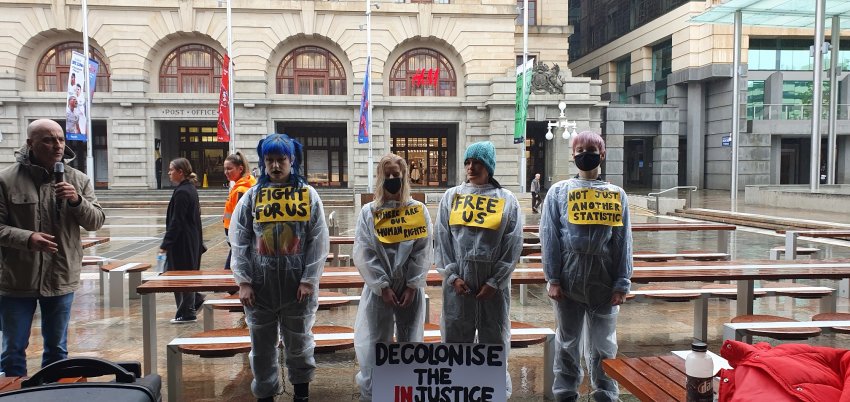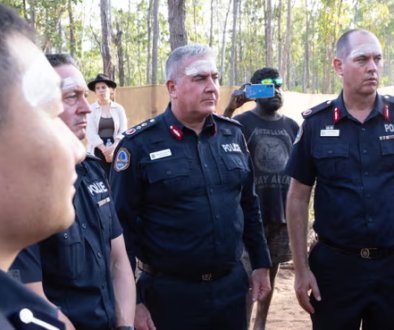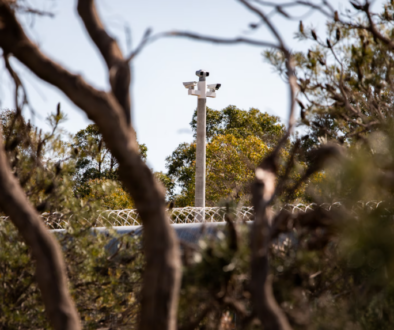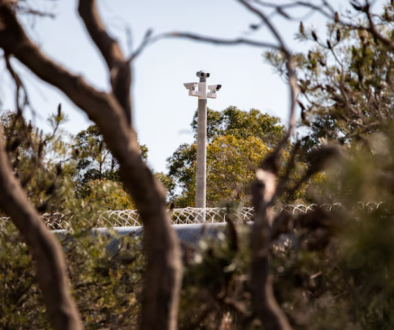
Banksia Hill and 17 other children’s prisons must be abolished
Originally published on greenleft.org.au written by Gerry Georgatos
Western Australia’s most vulnerable regional children are still being jailed at Banksia Hill Juvenile Detention Centre. Many have been uprooted from around the state and may spend months there, thousands of kilometres from home.
Some, including parliamentarians, believe criminal offences deserve carceral punishments.
Half the jailed children in Banksia have been removed by the state from their families or carers. Many of the children were born into disadvantages and unimaginable suffering. The majority have, at best, weak safety nets and one or both of their parents are dead or in jail. Their extended families are exhausted and unsupported in caring for far too many children that the state has betrayed.
These children have it worse than their parents and, if left unsupported, their children will fare even worse.
When will governments speak of fairness? When will they speak of nurture — restorative and therapeutic? It is not enough to just argue to “raise the age” of “criminal responsibility”. This is a given.
We must find the ways to improve these children’s lives, to validate them and to change the direction of their lives. We must ensure they do not languish in adult jails and die decades before their time.
Some believe Banksia Hill is a combustion of aberrant First Nations youth. I reject this. The tragedies and travesties of Banksia Hill are not Black, Brown or white problems. Banksia is a systemic problem made by governments.
There is nothing restorative, rehabilitative, therapeutic or transformational about Banksia. The high proportion of First Nations children in jail should not disguise the failings of the state.
Homelessness is caused when governments do not build social housing or invest in the state’s most vulnerable. If there were genuine programs for seriously vulnerable children — many of whom are homeless, transient, orphaned — the Children’s Court would be referring them to such programs.
Governments boast of such programs. But when children front the court, judges have nowhere to release them. Good psychosocial and psycho-educative models do not exist in WA or Australia-wide.
Where children can be bailed, well resourced community-based facilities must be accessible. Where children need to be remanded to secure facilities, they must be tiered by age-bracket — 10 to 12 years, 13 and 14, 15 and 16, 17 and 18.
These secure facilities must be places where one-on-one support is guaranteed and delivered by seasoned experts. But Banksia Hill children’s prison must be closed, as should all child prisons.
WA needs to urgently reform child bail laws and present options for children to remain with families, where possible, or with responsible adults. It needs to invest in safety nets with substantive outreach supports, mentors and local secure psychosocial community-based facilities.
I am responsible for a class action on behalf of former and present detainees. Testimonies from hundreds of former and recently released Banksia detainees describe the same horrors.
The forgotten children of Banksia, as I describe them, are our most impoverished, most traumatised children. The majority are born into multiple disadvantages. All have experienced major traumas. A significant proportion has no safety nets: many have no parents.
Governments spend more on criminalising children than providing local, wrap-around services for them and their families. Because the forgotten children of Banksia have been failed, about 70% will finish up in jail when adults.
Nearly all the children in Banksia, who are to go to WA’s notorious maximum security adult jail Casuarina, will be incarcerated as adults.
I am haunted by the suicides of 18 and 19-year-old former Banksia detainees, who finished up on the avoidable train wreck journey to adult jails.
Why are we investing in child prisons and prison guards when we should be investing in social care workers, outreach and psychosocial supports?
The Senate voted in 2019 to keep jailing 10-year-old children, further solidifying this nation’s bad reputation.
A successful win by the plaintiffs in the class action would compel governments to find humane ways forward rather than a children’s prison.
So far, more than 500 have registered, with thousands more likely to come.
Each affected person requires adequate compensation to have a chance at a better life. The life many were born into needs to be addressed by life-changing compensation — and by validating that they have been unsupported. Being heard matters.
If the Banksia Hill plaintiffs win this class action, the biggest of its type, precedents will be set for change and reform not just in WA, but in every state and territory.
One youth said: “I want to be part of history — that my children one day do not finish up locked up like me from 11-years-old. And like my father when he, too, was a kid.”
We have heard many tragic and harrowing testimonies and believe it is long overdue for the courts and the country to do the same. We must not give up. We must fight like never before for these children.
[Gerry Georgatos is working with National Suicide Prevention and Trauma Recovery Project colleagues, Megan Krakouer and Connie Georgatos on the class action led by Levitt Robinson Lawyers.]

Banksia Hill and 17 other children’s prisons must be abolished
Originally published on greenleft.org.au written by Gerry Georgatos
Western Australia’s most vulnerable regional children are still being jailed at Banksia Hill Juvenile Detention Centre. Many have been uprooted from around the state and may spend months there, thousands of kilometres from home.
Some, including parliamentarians, believe criminal offences deserve carceral punishments.
Half the jailed children in Banksia have been removed by the state from their families or carers. Many of the children were born into disadvantages and unimaginable suffering. The majority have, at best, weak safety nets and one or both of their parents are dead or in jail. Their extended families are exhausted and unsupported in caring for far too many children that the state has betrayed.
These children have it worse than their parents and, if left unsupported, their children will fare even worse.
When will governments speak of fairness? When will they speak of nurture — restorative and therapeutic? It is not enough to just argue to “raise the age” of “criminal responsibility”. This is a given.
We must find the ways to improve these children’s lives, to validate them and to change the direction of their lives. We must ensure they do not languish in adult jails and die decades before their time.
Some believe Banksia Hill is a combustion of aberrant First Nations youth. I reject this. The tragedies and travesties of Banksia Hill are not Black, Brown or white problems. Banksia is a systemic problem made by governments.
There is nothing restorative, rehabilitative, therapeutic or transformational about Banksia. The high proportion of First Nations children in jail should not disguise the failings of the state.
Homelessness is caused when governments do not build social housing or invest in the state’s most vulnerable. If there were genuine programs for seriously vulnerable children — many of whom are homeless, transient, orphaned — the Children’s Court would be referring them to such programs.
Governments boast of such programs. But when children front the court, judges have nowhere to release them. Good psychosocial and psycho-educative models do not exist in WA or Australia-wide.
Where children can be bailed, well resourced community-based facilities must be accessible. Where children need to be remanded to secure facilities, they must be tiered by age-bracket — 10 to 12 years, 13 and 14, 15 and 16, 17 and 18.
These secure facilities must be places where one-on-one support is guaranteed and delivered by seasoned experts. But Banksia Hill children’s prison must be closed, as should all child prisons.
WA needs to urgently reform child bail laws and present options for children to remain with families, where possible, or with responsible adults. It needs to invest in safety nets with substantive outreach supports, mentors and local secure psychosocial community-based facilities.
I am responsible for a class action on behalf of former and present detainees. Testimonies from hundreds of former and recently released Banksia detainees describe the same horrors.
The forgotten children of Banksia, as I describe them, are our most impoverished, most traumatised children. The majority are born into multiple disadvantages. All have experienced major traumas. A significant proportion has no safety nets: many have no parents.
Governments spend more on criminalising children than providing local, wrap-around services for them and their families. Because the forgotten children of Banksia have been failed, about 70% will finish up in jail when adults.
Nearly all the children in Banksia, who are to go to WA’s notorious maximum security adult jail Casuarina, will be incarcerated as adults.
I am haunted by the suicides of 18 and 19-year-old former Banksia detainees, who finished up on the avoidable train wreck journey to adult jails.
Why are we investing in child prisons and prison guards when we should be investing in social care workers, outreach and psychosocial supports?
The Senate voted in 2019 to keep jailing 10-year-old children, further solidifying this nation’s bad reputation.
A successful win by the plaintiffs in the class action would compel governments to find humane ways forward rather than a children’s prison.
So far, more than 500 have registered, with thousands more likely to come.
Each affected person requires adequate compensation to have a chance at a better life. The life many were born into needs to be addressed by life-changing compensation — and by validating that they have been unsupported. Being heard matters.
If the Banksia Hill plaintiffs win this class action, the biggest of its type, precedents will be set for change and reform not just in WA, but in every state and territory.
One youth said: “I want to be part of history — that my children one day do not finish up locked up like me from 11-years-old. And like my father when he, too, was a kid.”
We have heard many tragic and harrowing testimonies and believe it is long overdue for the courts and the country to do the same. We must not give up. We must fight like never before for these children.
[Gerry Georgatos is working with National Suicide Prevention and Trauma Recovery Project colleagues, Megan Krakouer and Connie Georgatos on the class action led by Levitt Robinson Lawyers.]



